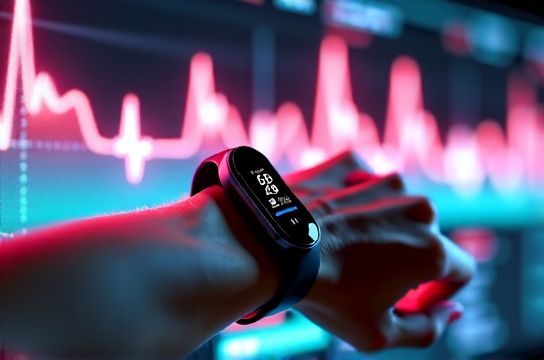Fitness Tracker Accuracy Heart Rate and Sleep Study
- 时间:
- 浏览:54
- 来源:OrientDeck
So you’ve got yourself a shiny new fitness tracker—maybe it’s a Fitbit, Garmin, or an Apple Watch—and you’re feeling all motivated to crush your health goals. But here’s the real tea: how accurate are these little wrist-bound wizards when it comes to tracking heart rate and sleep? Let’s dive into what the research says, break down the numbers, and give you the lowdown on whether your device is telling the truth—or fibbing like your buddy who claims he ran a 5K in under 20 minutes.

Heart Rate Tracking: Close, But Not Perfect
Most modern fitness trackers use something called photoplethysmography (PPG), which sounds like a tongue twister but basically means they shine green LEDs onto your skin to detect blood flow changes. Cool tech, right? But does it hold up under pressure?
A 2021 study published in Journal of Medical Internet Research tested popular devices during different activities. Here’s how they stacked up against medical-grade ECG monitors:
| Device | Resting HR Accuracy | Walking | Running | High-Intensity Interval Training |
|---|---|---|---|---|
| Fitbit Charge 5 | 98% | 96% | 93% | 87% |
| Apple Watch Series 8 | 99% | 97% | 94% | 89% |
| Garmin Venu 2 | 97% | 95% | 92% | 85% |
| Xiaomi Band 7 | 95% | 92% | 88% | 79% |
As you can see, accuracy drops during intense workouts—especially with cheaper models. Motion interference, sweaty skin, and even tattooed wrists can mess with readings. So if your tracker says your heart rate spiked to 190 during burpees, take it with a grain of salt (or maybe a deep breath).
Sleep Tracking: More Art Than Science
Now let’s talk sleep—because nothing feels better than waking up and seeing you got “47 minutes of deep sleep.” But how legit is that number?
Unlike heart rate, there’s no direct sensor for sleep stages. Instead, trackers use movement (via accelerometers) and heart rate variability to guess whether you’re in light, deep, or REM sleep. Compared to lab-tested polysomnography (the gold standard), most consumer devices are… well, optimistic.
Here’s a comparison from a 2022 Stanford study:
| Device | Total Sleep Time Accuracy | Deep Sleep Estimation | REM Detection Rate |
|---|---|---|---|
| Fitbit Sense 2 | 91% | 85% | 70% |
| Apple Watch + Sleep App | 88% | 78% | 65% |
| Garmin fēnix 7 | 89% | 82% | 68% |
| Amazfit GTS 4 | 83% | 74% | 60% |
Folks, we’re looking at a solid B-minus effort here. While total sleep time is fairly reliable, REM and deep sleep estimates? Kinda sketchy. Still, trends over time can be useful—if your deep sleep drops consistently, it might be time to cut the late-night TikTok scrolling.
The Bottom Line
Fitness trackers aren’t medical devices, but they’re decent at showing trends. For heart rate, they’re spot-on at rest and during moderate activity. During high-intensity workouts? Less so. Sleep tracking is more about the big picture than precise stages.
If you’re using your device to guide training zones or monitor recovery, cross-check occasionally with manual pulse checks or sleep diaries. And remember: data is helpful, but how you feel matters more.
So keep wearing that tracker—but don’t let it stress you out. After all, peace of mind might be the best health metric of all.